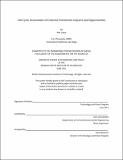Life cycle assessment of concrete pavements : impacts and opportunities
Author(s)
Loijos, Alex (Alexander Nikos)
DownloadFull printable version (2.804Mb)
Other Contributors
Massachusetts Institute of Technology. Technology and Policy Program.
Advisor
John Ochsendorf.
Terms of use
Metadata
Show full item recordAbstract
The concrete pavement network in the United States plays a crucial role in the economy by enabling the transport of people and goods, but it also leads to resource consumption and environmental impacts. This thesis is fundamentally motivated to reduce the impact that concrete pavements have on climate change. The principal methodology that is used is life cycle assessment (LCA), which comprehensively includes all five primary phases of the life cycle: materials extraction and production, pavement construction, pavement rehabilitation, the use phase, and end-of-life recycling and disposal. This work informs the reduction of life cycle greenhouse gases (GHGs) through a three-pronged approach to: 1) comprehensively quantify GHG emissions for structures representing all primary pavement types in the US, 2) establishes a benchmark for GHG emissions from all concrete pavements in the US constructed annually, and 3) identifies five reduction strategies and measures the GHG reduction that is obtainable through these strategies, both at the project-level for different road classes and at the national level. This provides a portfolio of GHG reduction options to national and regional policymakers, transportation agencies, and pavement engineers.
Description
Thesis (S.M. in Technology and Policy)--Massachusetts Institute of Technology, Engineering Systems Division, Technology and Policy Program, 2011. This electronic version was submitted by the student author. The certified thesis is available in the Institute Archives and Special Collections. Cataloged from student submitted PDF version of thesis. Includes bibliographical references (p. 118-121).
Date issued
2011Department
Massachusetts Institute of Technology. Engineering Systems DivisionPublisher
Massachusetts Institute of Technology
Keywords
Engineering Systems Division., Technology and Policy Program.